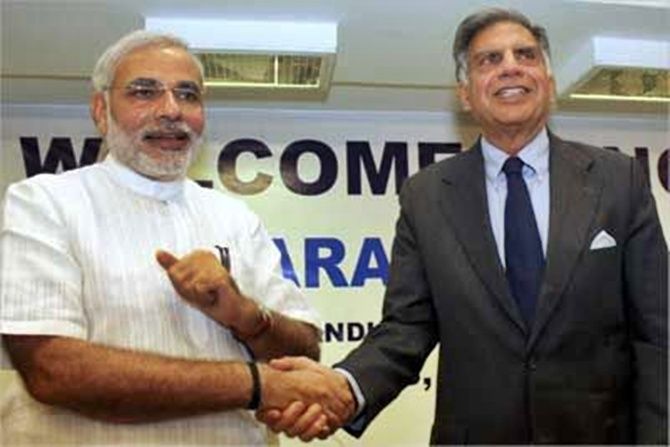 | « Back to article | Print this article |
'Tata may have sensed that the suddenness of the decision to replace Mistry would become controversial and it was proper to keep the prime minister informed of the decision,' says A K Bhattacharya.
 Why would a newly appointed interim chairman of a conglomerate send a letter to the country's prime minister informing him about the board meeting of its holding company and the decision on a sudden change of guard?
Why would a newly appointed interim chairman of a conglomerate send a letter to the country's prime minister informing him about the board meeting of its holding company and the decision on a sudden change of guard?
In the normal course, no company usually considers it necessary to inform the prime minister of such decisions on either removing a chairman or the process to be followed in finding a successor.
But this is exactly what Ratan Tata did soon after the October 24 meeting of the board of Tata Sons that removed Cyrus Mistry as its chairman.
To be sure, Tata had sent off at least two letters on October 24 after assuming charge as the interim chairman of Tata Sons, the Tata group's holding company.
One was to the employees of the Tata companies and the other was to Prime Minister Narendra Modi.
The letter to the employees was understandable. It explained to them the key decisions taken at the board meeting.
It informed them that Mistry has been replaced as Tata Sons chairman with immediate effect, a new management structure is being put in place and a selection committee has been set up to identify the next chairman and complete that process within four months.
More importantly, Tata's letter explained that he had agreed to take upon himself the new responsibility 'in the interest of stability of and assurance to the Tata group.'
Tata's letter to the prime minister was almost similar to the one he had sent the employees, except that it did not explain why he had agreed to assume the new role.
While his letter to the employees was expected, the letter to Modi took many people by surprise.
Corporate governance norms required Tata to inform all the shareholders and employees about the decision taken by the Tata Sons board. But there was no obligation to keep the prime minister informed of the change of guard.
In the past, however, corporate leaders have often kept senior government leaders in the loop on key developments concerning their companies, particularly when they were controversial.
Bharat Ram and H P Nanda left no stone unturned to plead with the ruling Congress party leaders and seek their intervention in the early 1980s, when their respective companies were under a takeover threat from the London-based Swraj Paul of the Caparo Group.
Such lobbying did help ward off the takeover threat.
In the late 1980s, the scions of the Modi family (which at that time ran the country's fourth-largest business empire) were engaged in an ugly battle over splitting their businesses.
This had led to Dayawati Modi, Gujarmal Modi's widow, and her sons to meet Rajiv Gandhi, who was then the prime minister, and seek government intervention to resolve the dispute.
The government stayed away from the Modi family dispute, but the State-owned financial institutions did play a key role by forcing a resolution, thanks to their stake in the many group companies.
Instances of business leaders keeping the government of the day informed of developments in their companies have become rare in post-reforms India after 1991.
This is largely because the government has ceased to have much say in the affairs of private sector companies and corporate leaders have also realised it is always better not to involve the government in settling their disputes.
The ugly dispute between the Ambani brothers in 2004-2005 did not see any overt lobbying with the government although attempts to seek government intervention may have been made.
But the government of the day stayed out of it and allowed the dispute to be settled between the two brothers.
So, why did Tata decide to send a letter to Modi informing him on the replacement of Mistry? There could be two possible reasons.
One, Tata may have sensed that the suddenness of the decision to replace Mistry would become controversial and it was proper to keep the prime minister informed of the decision.
Tata was not wrong. With the surfacing of Mistry's mail to Tata Sons board members, which raised many controversial issues, the dust over Mistry's removal is not going to settle soon.
Two, Tata has enjoyed a good relationship with Modi since the latter's days as chief minister of Gujarat.
When Mamata Banerjee's agitation pushed the Tata Nano factory out of Singur in West Bengal, it was Modi who had sent out an SMS to Tata saying: 'Swagatam.' The rest is history.
Tata relocated the Nano factory in Sanand and described Modi as the good M as opposed to the bad M.
The real reason may never be known, but speculation will always be rife on why Tata shot off that letter to Modi, even though it was strictly not necessary.
And particularly after Tata reportedly had a one-to-one meeting with Modi last Friday, October 28, just days after a similar Mistry meeting with the PM on Tuesday, October 25.